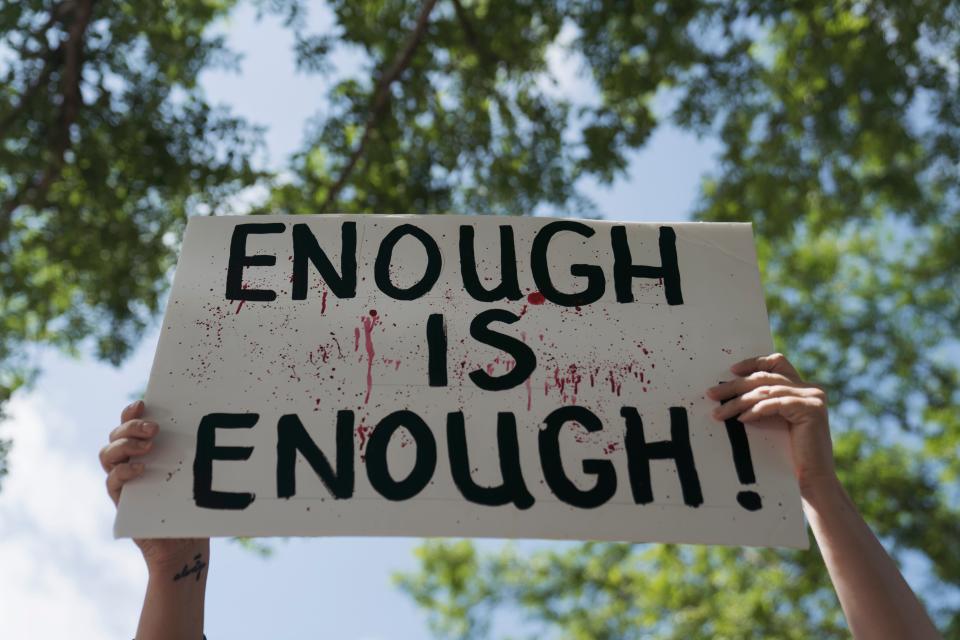I've confronted an active shooter. We need more answers to know what went wrong in Texas.
Another day in America, another mass shooting and more "thoughts and prayers." It’s the nightmare that never seems to end.
As usual, the narrative has shifted from the shooter to the gun and now toward the police response. It’s an inevitable and predictable pattern, but one of worthy inspection. Some details are becoming more clear about the tragic mass shooting in Uvalde, Texas, that took the lives of 19 children and two teachers.
Steven McCraw, the director of the Texas Department of Public Safety, said in a news conference Friday that "it was the wrong decision" when law enforcement at the scene transitioned from an "active shooter" response to a "barricaded suspect" response. That decision needs a closer inspection and analysis since 911 calls were still coming from inside the classroom.
'Something went terribly wrong'
An active shooter situation provides no time for planning or negotiation. Every attempt must be made by law enforcement to gain access to the location where the shooter is and stop them. A barricaded suspect is someone that can’t escape – they’re cornered. A supervisor must ensure that everyone is safely out of the kill zone before negotiating with the subject. This is referred to as “isolating and containing.”
In this instance, something went terribly wrong. The chaos likely caused confusion, which may have led to the wrong decision. Part of the training for critical incidents must include intelligence gathering and a way to disseminate it. Information is the lifeblood for making well-informed decisions.
Be very mad about this: Texas schoolchildren begged for help with officers waiting outside
At the very least, there appears to be a total breakdown of communication that led to the transition decision. For instance, did 911 operators reach out to the on-scene commander to let them know that calls were still coming in from inside the classroom where the shooter was located?
The police are responsible for protecting life and property. The responsibility to preserve life always comes first. I seldom use the word "always." In an active shooter incident, the police must engage at their own peril to direct attention and bullets toward them. As an officer, your job is to divert attention toward you; that's the goal. This can buy time to allow people to escape.
Every second an active shooter ducks to hide behind cover can possibly allow another person to escape.
A tired GOP cliché: In wake of Texas shooting, Greg Abbott points finger at Chicago
Waiting for the backup to arrive is not an option in active-shooting incidents. The shooter may be done firing by the time backup arrives. Rather than waiting, the supervisor on the scene must take charge and start directing the officers who are already there: Law enforcement agencies by now should have ensured their officers were trained and equipped with the tools needed to engage and neutralize an active shooter.

'You get tunnel vision'
I’ve had the unfortunate experience of being in an armed gunfight. My partner in the New York Police Department and I walked into a robbery that turned into a hostage crisis in 1994. Three armed men with TEC-9s versus two cops – one armed with a 9 mm and the other, me, with a .38. Six people were being held hostage.
You get tunnel vision. You can hear and feel the pulse in your ears. Your senses narrow to one: sight. No others seem to work. No amount of training can prepare you for that, but what training can do is keep you in the fight. We had the chance to escape but didn’t. Bravery? No. Foolish? Probably, but it had to be done. We had to engage before our backup arrived, which took nearly seven minutes - the longest seven minutes of my life.
We survived and the hostages were rescued, but not every cop is so lucky.
Normalized: Why do mass shootings keep happening? Because this is what we've allowed America to become.

A lesson for law enforcement
Friday's news conference was clearly a moment of anguish and grief for the community and the law enforcement officers that serve. McCraw fought back tears and his voice choked up as he spoke.
“Ultimately, this is tragic,” McCraw said. “What do you tell the 19, the families of 19 kids, or the families of two teachers?”
Policing can change a person over a career, but one critical incident that involves multiple fatalities, especially children, can have dire consequences on an officer’s mental health. Each officer will react differently. The signs may not show up immediately or visibly but they can manifest over time.
Officers will need access to counseling to deal with this horrific event.
But there are more questions that need to be answered about how authorities released information about the shooting.
I’m sure reporters listened to Friday's press conference with a keen ear. It’s not unusual to hear that information has changed in an event such as this, but there is a lesson to be learned for law enforcement: You are better off leaving out certain statements until you are sure they are accurate.
The statement about the school resource officer engaging the gunman is particularly disturbing since it’s not even close to being true. I learned a long time ago in policing that it’s better to throw yourself on the sword than dance around a mistake.
Joseph Giacalone is a retired New York Police Department sergeant, Medal of Valor recipient, author and adjunct professor at John Jay College of Criminal Justice.
You can read diverse opinions from our Board of Contributors and other writers on the Opinion front page, on Twitter @usatodayopinion and in our daily Opinion newsletter. To respond to a column, submit a comment to letters@usatoday.com.
This article originally appeared on USA TODAY: Uvalde shooting: We need to examine how Texas officers responded

 Yahoo Movies
Yahoo Movies 